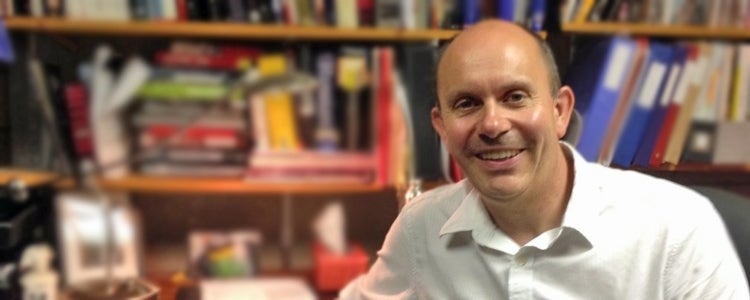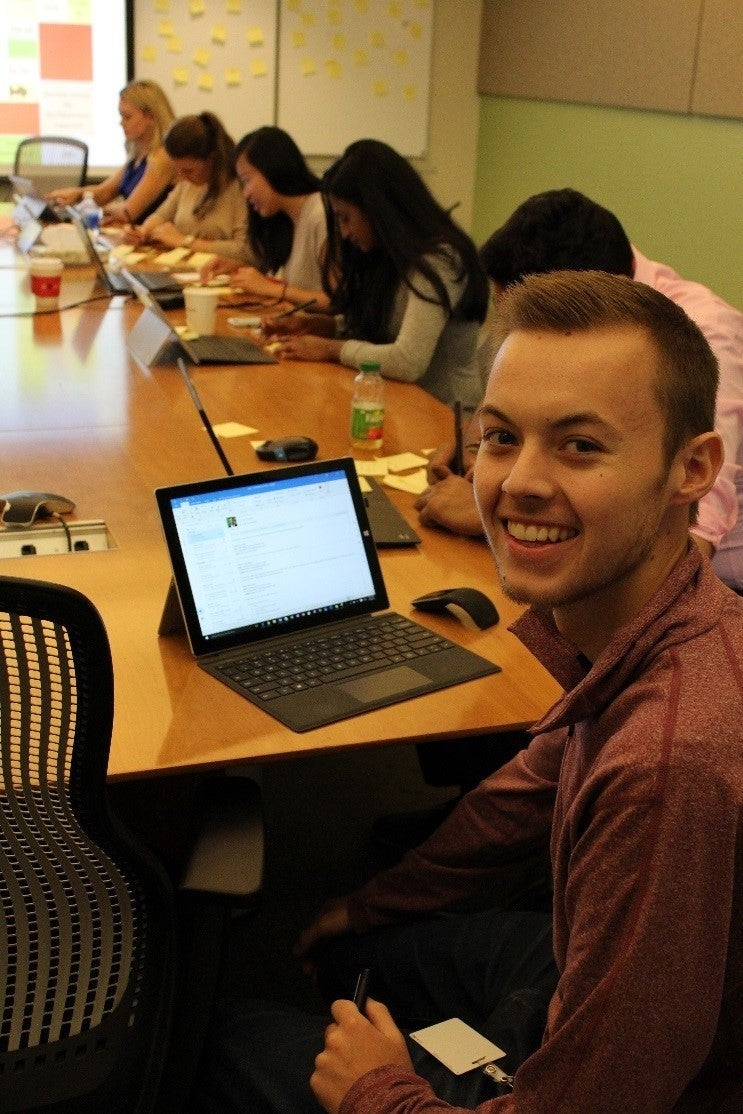Editor:
Brandon Sweet
University Communications
bulletin@uwaterloo.ca
Tales of a Teacher - Gary Bruce

This is the second of three Centre for Teaching Excellence Teaching Stories that will be featured in the Daily Bulletin this week.
When a group of dedicated students from his German history courses approached Dr. Gary Bruce in 2010 to ask him to take them to Germany, he didn’t balk at the challenge. Instead, he organized a 10-day trip that could be taken as a class for credit, and brought his first group of students overseas. In Germany, he showed them not only historical monuments, but monumental people as well. It became the trip of a lifetime for students, allowing them to experience historical places alongside a professor who has studied German history for more than two decades.
When Bruce started teaching, he didn’t plan to develop a unique travel course. However, he finds that bringing his students overseas allows them to engage in deeper learning as they integrate concepts of memory, history, and culture into one assignment. "They really leave the trip with the understanding that memory is not objective," says Bruce. Instead, he says, it’s political: the way we choose to memorialise events such as the Holocaust reveals something about our current culture. In order to allow them to experience this for themselves, they’re given the opportunity to meet a former Stasi officer with a wildly different perspective on East Germany and modern-day Germany. "Meeting him de-centers Canada," Bruce explains. As the Stasi officer justifies the East German Weltanschauung and criticizes the current Western system, it illustrates the gray area between the two political ideas.
In preparation for the travel course, students attend seminars and read material pertaining to the history and culture of Germany. Since they come on the trip with many different levels of knowledge, this preparation helps ensure that everyone understands the context of the experience they are about to have. When they return, students complete a project that combines academic research with their own personal experiences. Working on this project provides them with a glimpse into what it means to be a professional historian.
By treating his students as professionals, Bruce embodies his own philosophy on teaching. “I always treat each student with respect,” he says. To this end, he encourages everyone in his courses to actively participate in every aspect. Without their participation, he adds, he couldn’t teach his classes.
Asked to share his favourite teaching moment, Bruce leads with a baseball joke. “If you ask a baseball fan what the best game was, they’ll answer ‘the one that’s playing tonight.’ That’s how I feel about teaching – my favourite moment is the next time I get to teach.”
Tech giant takes on first work-term AHS student
by Andreea Perescu

Rhys Hollis has landed his first two co-op work-terms as a member of the Xbox team at Microsoft Canada Inc. Hollis is second-year Recreation and Leisure student, with a major in Recreation and Sport Business.
“I saw the Microsoft posting, and I thought it was well out-of-my-league since I am a junior looking for a four-month co-op, and they were looking for senior students on an eight-month term,” explained Hollis.
But he applied anyway, hoping that his academic background in data analysis and communication would set him apart from other applicants. “When I received an interview it became real. I thought, ‘I may actually get this job!’ so I made the necessary arrangements with my student advisor to change my sequence just in case. A few weeks after the interview I received an offer from Microsoft Canada.”
Now, Hollis has entered the gaming world as an Xbox Marketing Assistant. As an integral part of the team, Hollis collects and interprets user data, which he then presents to his managers for strategic use. The data focuses on the Xbox console, accessories, games and Xbox live, which is the online multiplayer platform.
“My academic background has helped me develop a strong work ethic which has transferred to my work-terms,” said Hollis. “Co-op has also allowed me to test the knowledge I’ve gained in classes and put it into practice in real-world situations.”
Hollis’ first two co-op work-terms at the Microsoft Canada Inc. have made a positive impact on his future career. Currently, Hollis is excited about completing his studies through Waterloo’s study abroad program –preferably by travelling back to his Scottish roots. He also plans to pursue a Master of Business, Entrepreneurship and Technology (MBET) at Waterloo.
Waterloo Innovation Summit seeks volunteers
The University of Waterloo, in partnership with Communitech, is seeking volunteers for the Waterloo Innovation Summit (WIS) on September 15, 2016.
The Waterloo Innovation Summit brings leading influencers from government, universities, and industry together to share their ideas about developing innovative products and services. It’s a critical conversation, and it takes place right here in Canada’s leading technology ecosystem.
Volunteers are integral to the ongoing success of this high-profile event. Please check out our posting on LEADS, using your WatIM credentials for further information on how to apply.
Link of the day
10 years ago: Pluto banished to the planetary doghouse
When and where
Deadline for students to be Fees Arranged, Wednesday, August 24.
Chemistry Department Seminar Series featuring Dr. Alexander Makarov, Thermo Fisher Scientific, Bremen, Germany, “Frontiers of Orbitrap Mass Spectrometry”, Thursday, August 25, 2:30 p.m., DC 1304.
Co-operative Work Term ends, Friday, August 26.
Co-operative Work Term begins, Monday, August 29.
Food Services Recruitment Fair, Monday August 29, 3:00 p.m. to 6:00 p.m., Fed Hall.
International Student Orientation, Friday, September 2 to Sunday, September 4.
Orientation 2016, Sunday, September 4 to Saturday, September 10.
Out-of-province/American Orientation, Sunday, September 4.
Labour Day holiday, most University operations closed, Monday, September 5.
Exchange/Study Abroad Orientation, Monday, September 5.
Transfer Student Orientation, Monday, September 5.
Graduate Student Orientation, Tuesday, September 6.
Lectures begin, Thursday, September 8.
The Writing Centre presents "Professionalism in your communication: How to talk to your professors," Tuesday, September 13, 10:00 a.m. to 12:00 p.m.
2016 Waterloo Innovation Summit, Wednesday, September 14 to Friday, September 16.
Writing Centre presents "STEM lab reports: Improve your lab report writing," Thursday, September 15, 1:00 p.m.
Waterloo Centre for German Studies presents "Von Berlin to Kitchener: Connotations and Cultures, A Discussion Panel", Thursday, September 15, 7:00 p.m., Kitchener Public Library.
Doors Open Waterloo Region, Friday, September 16 to Saturday, September 17.
September Senate meeting, Monday, September 19, 3:30 p.m., NH 3407.
UWRC Book Club featuring House in the Sky by Amanda Lindhout, Wednesday, September 21, 12:00 p.m., LIB 407.
Feds Clubs and Societies Days, Thursday, September 22, 11:00 a.m. to 6:00 p.m., Student Life Centre Great Hall.
Research Talks event featuring Linda Nazar, "New vistas in electrochemical energy storage," Friday, September 23, 12:00 p.m., QNC 0101.
Further Education Boot Camp, Saturday, September 24.
Positions available
On this week's list from the human resources department, viewable on the UWaterloo Talent Acquisition System (iCIMS):
- ID# 2016-1192 - Communications Specialist - WISE-General, USG 6
- ID# 2016-1126 - CTE Faculty Liaison - Science - Center for Teaching Excellence, USG 9-11
- ID# 2016-1200 - Executive Assistant - VP Academic & Provost, USG 9
- ID# 2016-1198 - Financial Aid Systems Analyst - Registrar-Student Awards, USG 8/9
- ID# 2016-1176 - Manager, Global Programs and Initiatives - WISE-General, USG 10
- ID# 2016-1188 - Marketing & Recruitment Specialist - Science - Registrar-Undergraduate Recruitment, USG 9
- ID# 2016-1195 - Marketing Specialist - Campus Life - Federation of Students, USG 7
- ID# 2016-1199 - Program Assistant - Dean of Environmental Sustainability Office - Economic Development, USG 6
- ID# 2016-1190 - Records Assistant - Registrar, USG 5-7
- ID# 2016-1174 - Research Technology Specialist - Kinesiology, USG 8
- ID# 2016-1181 - Senior Communications Officer - Dean of Engineering Office - Development, USG 10